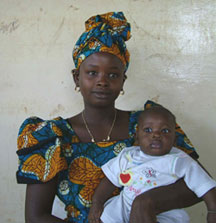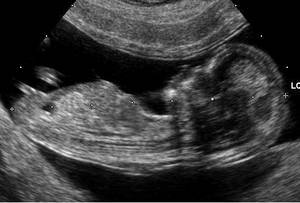Eating and Epigenetics - How maternal nutrition alters gene expression
Interview with
Chris - It's well known that what you eat, drink or smoke during pregnancy can have long term consequences on the developing foetus. But now, researchers at Cambridge University have identified how a mother's diet before she becomes pregnant can lead to genetic changes that last well beyond birth. To find out more, we're joined by Professor Nabeel Affara...
Nabeel - This study is really a collaboration between us in the Department of Pathology and Professor David Dunger in the Department of Paediatrics, together with Professor Andrew Prentice at the London School of Hygiene and Tropical Medicine who heads up the MRC International Nutrition Unit. It's a study that's based in the Gambia where, in rural Gambia, there is a chronic shortage of food. Superimposed upon that, you've got a seasonal variation in the food supply because the food that they eat is grown in the wet season, that is called the hungry season, and that then is harvested in the dry season, and that's when food is plentiful.
Chris - So you've got this nice natural variation in people being relatively well fed and relatively less well fed.
Nabeel - That's right.
Chris - So, you can compare the two.
Nabeel - Exactly.
Chris - And so, what did you actually do with those people?
Nabeel - What has been observed here is that with this seasonality, there is an impact on the incidents of infectious disease and mortality amongst young adults. Those born in the wet season die much more at a much younger age and have a much higher burden of infectious disease. So we wanted to ask the question whether exposures early in pregnancy or even at what we call the peri-conceptional period, that is before a woman becomes pregnant until  the time that pregnancy is confirmed, whether supplementation of the diet, particularly for known deficiencies in micronutrients, has an impact on this disease burden.
the time that pregnancy is confirmed, whether supplementation of the diet, particularly for known deficiencies in micronutrients, has an impact on this disease burden.
Chris - So there could be two effects going on, one could a genetic effect because of the woman becoming deficient in something before or around the time she gets pregnant and that could have a genetic legacy effect on the baby. The other is that the baby could just be exposed to an environment in which it's eating a relatively impoverished diet, and that makes it more prone to getting things down the line.
Nabeel - That's correct. So, what we wanted to ask is whether the offspring of women who received the supplementation compared to women who received a placebo - that is exactly the same pill but without the cocktail of minerals and micronutrients - whether when we examined the DNA of the offspring of these women, there was any difference in the epigenetic state. What's important to understand here is that we're not actually looking for changes in the DNA sequence, but actually changes, modifications to the DNA that affect the activity of genes.
Chris - This is where you get chemical markers, methyl groups, stuck onto the sides of genes that affect how well they get turned on or off. They're like a dimmer switch for genes, aren't they?
Nabeel - Exactly. And methylation, as the process is called, is adding a methyl group onto cytosine, one of the DNA bases. This can affect the activity of the gene, but it's one of many epigenetic changes that can take place that modulate the activity of genes. What appears to be the case is that once a state is set, this can be a long term state that may last for the life of the individual.
Chris - So you got these groups of women, recruited them into the study, randomized them to get either the placebo or the vitamin pills. How did you then follow up the offspring?
Nabeel - We took blood at two stages, one at birth from cord blood - therefore, that is blood from the baby at term - and extracted DNA from that. We then followed that up with peripheral blood from some of the same children at 9 months of age. We then ran an assay that measures the state of methylation of all genes across the human genome. We were be able to do this on a DNA chip called a methylation chip. Essentially, it allows you to compare the two states and ask whether there's a difference between the offspring whose mothers receive the supplementation and those whose mothers did not receive the supplementation.
Chris - And what did you find?
Nabeel - What we found was that the supplementation given over an 8-week period, right at the beginning of the pregnancy and before their pregnancy, had an impact at term and that there was a difference in a relatively small number of genes in the newborn. Then, at 9 months, we found many more changes as well. So, in a sense, there's a sort of programming going on early on and early exposure is programming the genome to have a certain pattern of activity.
 Chris - At this stage you only know that those genes changed their pattern. You don't know how that affects the expression, the amount of the genes that get made.
Chris - At this stage you only know that those genes changed their pattern. You don't know how that affects the expression, the amount of the genes that get made.
Nabeel - Exactly.
Chris - But, those genes presumably will give you enormous insights. There's a lot of avenues to follow now to ask, well, what do they do and how do they affect the health outcomes for these children?
Nabeel - You've hit the button there in that this work has identified candidates that might be influencing important aspects of their physiology and may give us insights into the pathology that these individuals suffer from. We need to go on and investigate precisely what those changes mean in terms of the activity of these genes.
Chris - To finish up, this is in individuals who are relatively impoverished in terms of their dietary intakes...
Nabeel - Yes.
Chris - What are the implications for people who are eating a relatively good diet? Does this nonetheless say, "Well, be careful because if you have micronutrient deficiencies, there may be implications even if you think you're eating a good diet."
Nabeel - This is highly relevant to our own society where food security is more assured, but overeating, exposures to, for example, excessive carbohydrate, we know can bring about similar epigenetic changes and may also impact on health at a later stage in life. Diabetes, for example, is a very good case in point. At the present time, we're suffering an epidemic of diabetes. So, it is important even in societies where there is an abundant food supply. The appropriate balance of nutrients is the key thing here for normal development.









Comments
Add a comment